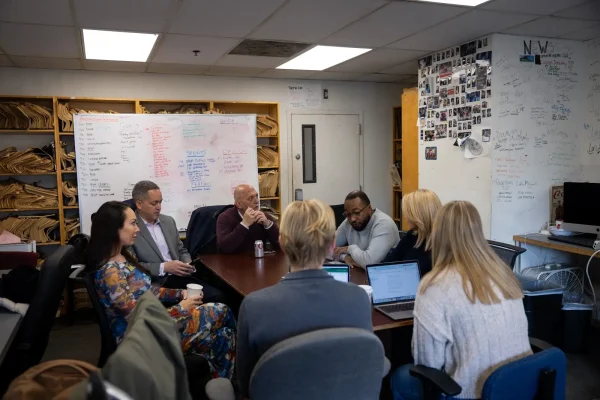The Hoya sat down with five of the six incoming Georgetown Institute of Politics and Public Service (GU Politics) fellows for the Spring 2025 semester Jan. 24 to discuss the 2024 election, young voters and trust in the media.
This semester’s fellows are Tony Fabrizio, chief pollster for Donald Trump’s 2016, 2020 and 2024 presidential campaigns; Quentin Fulks, the Biden-Harris and Harris-Walz campaigns’ principal deputy campaign manager; Don Graves (LAW ’95), former deputy secretary of commerce for the Biden administration; Cecilia Kang, a New York Times national technology correspondent; Meg Kinnard (SFS ’02), an Associated Press national politics reporter; and Heather Nauert, a former Trump administration State Department spokesperson. Cecilia Kang was unable to attend the interview.
While at Georgetown University, the six fellows will host weekly discussion groups beginning Feb. 10 where they will examine various political issues, including the America First movement and trust in journalism, with student groups.
Below is a partial transcript of the fellows’ discussion with The Hoya.

How do you think the 2024 presidential election will be remembered? What will it be defined by?
Kinnard: This was, among different cycles that I’ve covered and been part of the coverage for, something where there wasn’t a pause. We get through the primaries and then we’re into the general election, and then all of these other events just happened.
Fabrizio: We’re forgetting the indictments. We’re forgetting the conviction. There’s so many other things that happened that now seem to be in the rearview mirror, and they didn’t matter. But at the time, they were historic and they were groundbreaking, and everybody was holding their breath to see how they would impact the campaign on our side and on the other side.
Days after Donald Trump began his second presidential term, what do you think college students should be looking at?
Fulks: I think the young voters need to pay attention to the media. I think they really need to evaluate media sources and journalism and where they’re getting information from to figure out for themselves what is true.
Graves: I think college students should be paying attention to changes, rollbacks in programs and policy or deviations from biggest policies. I think more importantly, it’s whether or not the agglomeration of power in a handful of companies, tech companies, particularly those that drive social media, whether that continues or whether there’s some change, and how that impacts our ability to maintain our democracy going forward.
The Harvard Kennedy Institute of Politics released data indicating that voters between the ages of 18-24 are more conservative than those ages 25-29. What do you think helps to explain this, and what do you expect to see from future generations?
Fabrizio: This is going to sound trite: It’s becoming cool again to be a Republican.
Graves: The election turned on basically 1% of the voters, and this country is still split massively. I mean, 75 million to 77 million voters, and nearly 40% of the electorate chose not to vote. That tells us something about the state of this country.
According to the Pew Research Center, young adults are nearly just as likely to trust social media as they are national news outlets. How do you think the role of the media will continue to evolve?
Kinnard: I think more spaces to have those conversations is a good thing for our democracy. But all of that makes it more incumbent on those of us who are consuming that news to verify our sources, to figure out where that content is coming from. If it’s something you’ve never heard of, then maybe its origins and its sourcing isn’t something that you should be trusting.
Fulks: You’re talking about Fox News, CNN, MSNBC. You now have individuals — no board, no shareholders — a singular person in their basement that has twice the audience of them. And once they say something, it spreads like wildfire.
What is one piece of advice you wish you’d heard as a college student?
Graves: Relationships are the most important thing that you can build for your career. Worry less about trying to get to a certain position and what it takes to get to that position.
Kinnard: I was a Georgetown undergrad, and I loved going to college here and having some of those experiences and availing myself of what Washington has to offer, but I wish that I had taken the time to go have an adventure.
Nauert: Washington positions you perfectly to realize and learn more about what kinds of careers are available. Just keep your eyes open, ask lots of questions and utilize the fellows here to help you explore what opportunities you might want to pursue in the future.
Which cabinet pick, if any, won’t get confirmed?
Kinnard: [Secretary of Health and Human Services nominee Robert] Kennedy?
Graves: Kennedy.
Fabrizio: Pass.
Fulks: I gotta go Kennedy, too.
What is the most surprising thing you expect to see from the second Trump administration?
Nauert: Anything could happen. Really. Not going to get ahead of the president, but really, truly, anything could happen.
Who do you expect to see at the top of each presidential ticket in 2028?
Fabrizio: JD Vance and AOC.
Graves: I think the Democratic Party is going through a massive reevaluation, and so it may actually be someone outside of the usual names that are thrown around.
Kinnard: It’s somebody that we’re not thinking of.